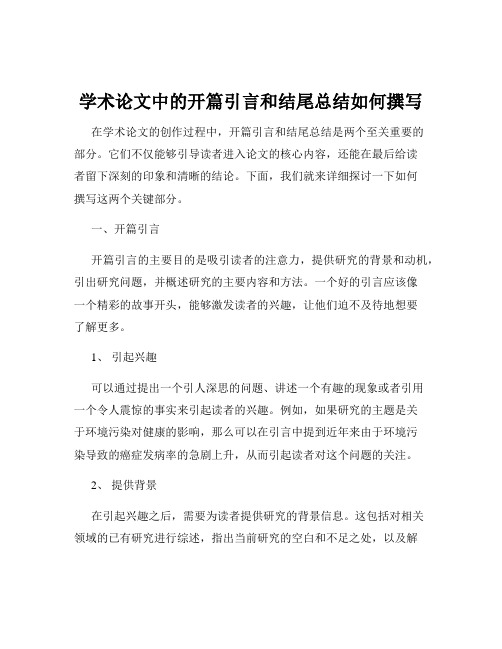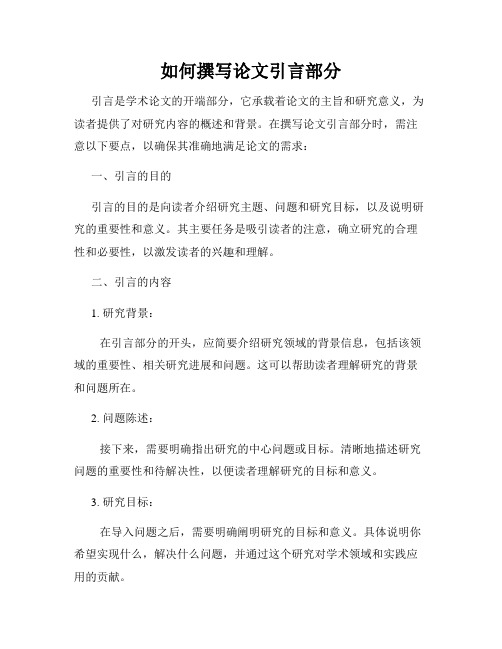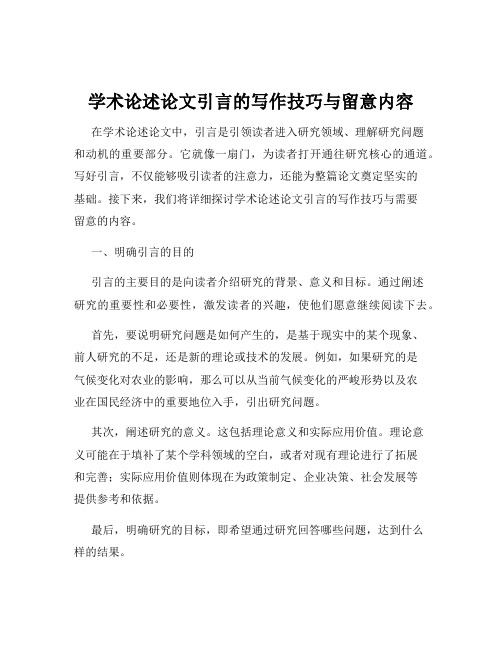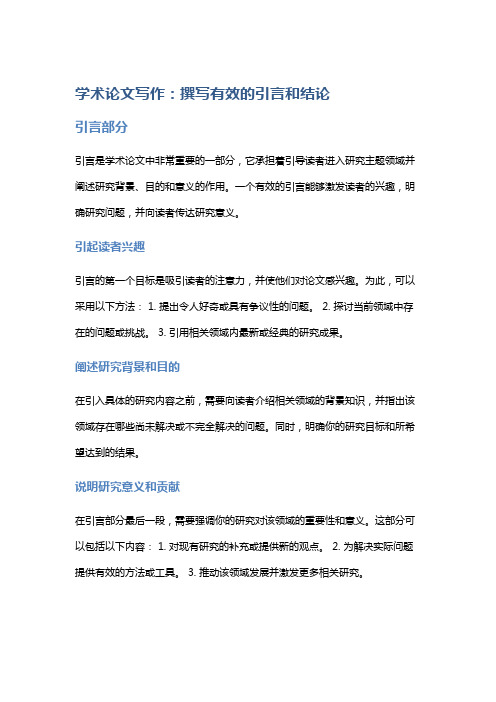学术论文写作:引言
学术研究论文引言的写作窍门与注意问题

学术研究论文引言的写作窍门与注意问题在学术研究的广袤领域中,论文引言如同一扇神秘的大门,引领读者走进研究的核心世界。
它不仅是对研究背景和动机的简要阐述,更是为整篇论文定下基调、激发读者兴趣的关键环节。
掌握引言的写作窍门,并避开常见的陷阱,对于成功撰写一篇出色的学术论文至关重要。
一、引言的重要性引言是学术论文的开篇之作,其作用不容小觑。
首先,它为读者提供了一个进入研究主题的入口,帮助他们快速了解研究的背景和意义。
通过清晰地阐述研究的起源和现状,引言能够让读者在短时间内把握研究的来龙去脉,明确其在学术领域中的位置。
其次,引言能够激发读者的兴趣和好奇心。
一个引人入胜的引言能够像磁铁一样吸引读者的注意力,使他们愿意继续深入阅读论文的后续部分。
相反,如果引言枯燥乏味或含糊不清,读者可能会在一开始就失去阅读的兴致。
此外,引言还为后续的研究内容和方法奠定了基础。
通过在引言中对研究问题和目标的明确阐述,读者能够更好地理解为什么要采用特定的研究方法和步骤,以及预期能够获得什么样的研究成果。
二、写作窍门1、引人入胜的开篇以一个引人注目的问题、一个有趣的现象或一个令人震惊的事实作为开篇,能够迅速抓住读者的注意力。
例如,如果研究的主题是关于环境污染对健康的影响,可以这样开头:“在当今社会,我们呼吸的空气、饮用的水和食用的食物都可能隐藏着看不见的威胁,环境污染正悄无声息地侵蚀着我们的健康,这背后的真相究竟是什么?”2、清晰阐述研究背景在引言中,要对研究主题的相关背景进行详细而清晰的阐述。
这包括介绍该主题在学术领域中的发展历程、前人的研究成果以及当前存在的研究空白。
通过对背景的梳理,能够让读者明白为什么你的研究是有必要的。
例如,如果研究的是某种新型药物的疗效,可以先介绍目前治疗该疾病的常用药物及其局限性,然后指出新型药物可能带来的突破和创新。
3、明确提出研究问题研究问题是引言的核心。
要明确、具体地提出研究问题,让读者清楚地知道你的研究要解决什么问题。
学术论文中的开篇引言和结尾总结如何撰写

学术论文中的开篇引言和结尾总结如何撰写在学术论文的创作过程中,开篇引言和结尾总结是两个至关重要的部分。
它们不仅能够引导读者进入论文的核心内容,还能在最后给读者留下深刻的印象和清晰的结论。
下面,我们就来详细探讨一下如何撰写这两个关键部分。
一、开篇引言开篇引言的主要目的是吸引读者的注意力,提供研究的背景和动机,引出研究问题,并概述研究的主要内容和方法。
一个好的引言应该像一个精彩的故事开头,能够激发读者的兴趣,让他们迫不及待地想要了解更多。
1、引起兴趣可以通过提出一个引人深思的问题、讲述一个有趣的现象或者引用一个令人震惊的事实来引起读者的兴趣。
例如,如果研究的主题是关于环境污染对健康的影响,那么可以在引言中提到近年来由于环境污染导致的癌症发病率的急剧上升,从而引起读者对这个问题的关注。
2、提供背景在引起兴趣之后,需要为读者提供研究的背景信息。
这包括对相关领域的已有研究进行综述,指出当前研究的空白和不足之处,以及解释为什么这个研究问题是重要的。
通过提供背景信息,读者可以更好地理解研究的意义和价值。
3、明确研究问题在引言的结尾,需要明确地提出研究问题。
这个问题应该是具体、清晰、可研究的。
例如,“本研究旨在探讨新型环保材料在降低室内空气污染方面的效果和机制。
”明确的研究问题能够让读者知道论文的核心关注点是什么。
4、概述研究方法如果可能的话,可以在引言中简要概述研究的方法。
这可以让读者对研究的可靠性和科学性有一个初步的了解。
但要注意,不要过于详细地描述方法,以免让引言显得过于冗长和复杂。
为了让引言更加吸引人,可以采用一些写作技巧。
例如,使用生动的语言、讲述个人的经历或者引用权威的观点。
但要注意,无论采用何种技巧,都要确保引言的内容是准确、客观、有说服力的。
二、结尾总结结尾总结是学术论文的收官之作,它的主要目的是对研究的主要发现进行总结和归纳,回答研究问题,讨论研究的局限性,并提出未来的研究方向。
一个好的结尾总结应该是简洁明了、重点突出、富有启发性的。
学术论文的引言部分写作技巧与注意事项

学术论文的引言部分写作技巧与注意事项引言部分是学术论文中非常重要的一部分,它的作用是引导读者了解研究背景、研究问题以及解决问题的重要性。
一个好的引言部分能够让读者对整篇论文产生兴趣,并理解论文的主旨。
本文将介绍学术论文引言部分的写作技巧与注意事项。
一、明确研究背景和问题引言部分的第一步是明确研究背景和问题。
在这一部分,你应该简洁明了地介绍研究领域的背景和现状,并指出已有研究工作的不足之处。
此外,你还需要明确论文的研究问题,并解释这个问题为什么值得研究。
二、引入相关文献在引言部分,你需要引入已有的相关文献,以便读者能够理解你的研究在相关领域中的位置和重要性。
你可以选择引用一些经典的研究论文或权威机构发布的报告,以支持你的研究问题和动机。
三、概述研究方法在引言部分的末尾,你可以简要概述你的研究方法,并解释你选择这些方法的原因。
这样可以让读者对你的研究有一个初步的了解,也能够证明你的研究方法是合理可行的。
四、注意事项除了以上的写作技巧,还有一些注意事项需要我们在撰写引言部分时注意:1. 简洁明了:引言部分应该保持简洁明了,避免使用过多的专业术语或复杂的句子结构。
尽量用通俗易懂的语言来表达你的研究目的和动机。
2. 重点突出:在引言部分中,你应该突出你的研究问题和意义,使读者能够快速理解你的研究目标,并产生兴趣。
3. 逻辑清晰:引言部分的各个段落之间应该有明确的逻辑关系,每个段落的内容应该衔接自然,使读者能够清晰地理解你的论文结构。
4. 不引用过多文献:引言部分不应该成为文献阐述的集合,避免过多地引用相关文献,而忽略对自己研究问题的阐述。
5. 避免主观性评论:在引言部分,应该尽量避免主观性评论或个人情感的表达,要以客观的态度来阐述你的研究问题和意义。
综上所述,学术论文引言部分的写作是非常重要的,合理的写作技巧和注意事项可以让读者快速了解你的研究,并对你的论文产生兴趣。
在撰写引言部分时,应该明确研究背景和问题、引入相关文献、概述研究方法,并注意简洁明了、重点突出、逻辑清晰、不引用过多文献以及避免主观性评论等方面的要求。
学术论题论文引言的写作策略与注意事项

学术论题论文引言的写作策略与注意事项在学术论文的撰写中,引言是开篇的重要部分,它就像一扇窗户,为读者展示了研究的背景、意义和方向。
写好引言,能够吸引读者的注意力,激发他们进一步阅读的兴趣,同时也为整个论文的展开奠定了坚实的基础。
下面,我们来详细探讨一下学术论题论文引言的写作策略与注意事项。
一、明确引言的目的引言的主要目的是向读者解释为什么要进行这项研究。
它应该回答以下几个关键问题:1、研究的问题是什么?2、为什么这个问题很重要?3、目前关于这个问题已经知道了什么?4、研究的空白在哪里?5、本研究打算如何填补这个空白?通过清晰地回答这些问题,引言能够为读者提供一个研究的全景图,使他们理解研究的必要性和创新性。
二、构建引言的结构一个好的引言通常具有一定的结构。
可以将其分为以下几个部分:1、引出研究主题可以通过讲述一个实际的现象、一个普遍存在的问题或者一个引人深思的案例来引出研究主题。
确保引入的方式能够吸引读者的兴趣,让他们想要了解更多。
2、阐述研究背景对研究主题的相关背景进行详细的介绍,包括历史发展、现状和存在的争议等。
引用相关的文献来支持背景信息的阐述,展示对已有研究的了解。
3、指出研究空白分析现有研究的不足之处,指出尚未解决的问题或者有待进一步探索的领域。
强调这些空白对于学术发展和实际应用的重要性。
4、提出研究问题和目标基于对研究空白的分析,明确提出本研究要解决的问题和期望达到的目标。
使读者清楚地知道研究的重点和方向。
5、简述研究方法和意义简要介绍将采用的研究方法,让读者对研究的可行性有一个初步的了解。
阐述研究的意义,包括对学术领域的贡献和对实际应用的影响。
三、写作策略1、保持逻辑清晰引言的各个部分之间应该有明确的逻辑关系,过渡自然流畅。
避免跳跃性的思维和混乱的表述,让读者能够轻松跟上思路。
2、突出重点重点强调研究的创新性和重要性,避免在无关紧要的细节上花费过多篇幅。
使读者能够快速抓住研究的核心要点。
学术论文引言、正文、致谢、附录的写作规范

学术论文引言、正文、致谢、参考文献、附录的写作规范1 引言1.1 定义国家标准GB7713-87规定:“引言(或绪论)简要说明研究工作的目的、范围、相关领域的前人工作和知识空白、理论基础和分析、研究设想、研究方法和实验设计、预期结果和意义等。
引言应言简意赅,不要与摘要雷同,不要成为摘要的注释。
一般教科书中已有的知识,在引言中不必赘述。
比较短的论文可以只用小段文字起着引言的效用。
学位论文为了需要反映作者已掌握了坚实的基础理论和系统的专门知识,具有开阔的科学视野,对研究方案作了充分论证,因此有关历史回顾和前人工作的综合评述,以及理论分析等,可以单独成章,用足够的文字叙述”。
引言的目的是给出作者进行本项工作的原因,企图达到的目的。
因此应给出必要的背景材料,让对这一领域并不特别熟悉的读者能够了解进行这方面研究的意义,前人已达到的水平,已解决和尚待解决的问题,最后应用一两句话说明本文的目的和主要创新之处。
引言最基本一点是介绍主要研究成果。
有的作者常常不在引言中指明他们的重要发现,或从摘要中删除那些重要的研究成果,而到论文的后部分才指明。
对科技论文而言,是一种写作错误,可能使读者在了解到那些重要的研究成果之前已停止了阅读。
引言应避免过分强调一个十分重要而涉及面广的领域,而自己仅完成了其中有限的一小部分工作。
1.2 构成与写作要求引言的构成及写作要求见表1。
2 正文正文部分是科技论文的核心,是体现研究工作成果和学术水平的主要部分。
国家标准GB7713-87对科技论文正文部分的编写格式没有明确要求和规定。
科技论文的结构形式取决于科研成果的内容。
不同的科研成果,需要用不同结构形式的科技论文来反映。
因为不同学科领域的科研成果,在研究方法、实验观察过程、逻辑推理、结果表现形式等方面不同。
一般来说,科技论文的内容包括:引言、原理、实验和观察方法、仪器设备、材料原料、调研对象、实验和观察的数据资料结果、观点和结论等。
其观点和结论是将获得的数据资料通过数理统计和技术处理,绘图列表等表达实验结果,再经过判断、归纳、推理和抽象等导出的。
论文引言是什么怎么写

论文引言是什么怎么写引言的定义引言是一篇学术论文中的重要部分,通常位于文章开头。
它对研究主题进行简要介绍,目的是为读者提供足够的背景信息,让他们了解研究的重要性、目的和意义。
引言部分可以视为文章的门户,引导读者进入论文的核心内容。
引言的功能引言在学术论文中扮演着关键的角色,它具有以下几个重要的功能:1.引入研究主题:引言首先要引入读者,并概述研究主题的背景和前沿进展。
通过提供相关背景信息,引言可以帮助读者了解研究领域的现状和问题的重要性。
2.明确研究目的和问题:引言应明确阐述研究目的和研究问题。
这些目的和问题应该清晰明了,以便读者了解作者所要解决的具体挑战。
3.概述研究方法:引言还应简要介绍采用的研究方法。
这有助于读者了解作者的研究方法是否切实可行,能否回答研究问题并实现研究目的。
4.介绍研究意义与贡献:引言还应强调研究的意义和潜在贡献,解释为什么研究这个问题的重要性以及结果对学术界或实践的影响。
引言的写作步骤下面是一些撰写引言的步骤和建议:1. 确定目标受众在撰写引言之前,需要明确你的目标受众是谁。
不同的读者可能对研究主题的背景和相关知识有不同的了解。
考虑到这一点,引言的简介程度和详细程度需要根据目标受众进行调整。
2. 研究主题的背景在引言的开头,提供研究主题的一般背景是非常重要的。
这个部分可以包括对先前研究的综述,以及该领域所面临的挑战和未解决的问题。
重点是向读者展示研究的重要性,并建立你的研究工作的合理性。
3. 突出研究问题接下来,明确阐述你的研究问题。
这个问题应该是清晰的、具体的,并且能够引起读者的兴趣。
确保你对研究问题进行了充分的解释,并解释为什么这个问题是具有挑战性和重要性的。
4. 概述研究方法在引言部分简要概述你采用的研究方法。
这可以让读者了解你在研究中使用的方法是否合理,以及你如何回答你的研究问题。
并简要说明为什么这些方法适合你的研究领域。
5. 强调研究意义和贡献最后,在引言的结尾部分强调研究的意义和潜在的贡献。
如何撰写论文引言部分

如何撰写论文引言部分引言是学术论文的开端部分,它承载着论文的主旨和研究意义,为读者提供了对研究内容的概述和背景。
在撰写论文引言部分时,需注意以下要点,以确保其准确地满足论文的需求:一、引言的目的引言的目的是向读者介绍研究主题、问题和研究目标,以及说明研究的重要性和意义。
其主要任务是吸引读者的注意,确立研究的合理性和必要性,以激发读者的兴趣和理解。
二、引言的内容1. 研究背景:在引言部分的开头,应简要介绍研究领域的背景信息,包括该领域的重要性、相关研究进展和问题。
这可以帮助读者理解研究的背景和问题所在。
2. 问题陈述:接下来,需要明确指出研究的中心问题或目标。
清晰地描述研究问题的重要性和待解决性,以便读者理解研究的目标和意义。
3. 研究目标:在导入问题之后,需要明确阐明研究的目标和意义。
具体说明你希望实现什么,解决什么问题,并通过这个研究对学术领域和实践应用的贡献。
三、引言的结构引言部分应具有合理的结构,以确保信息的逻辑流程和连贯性。
可以遵循以下结构:1. 第一段:简要介绍研究领域的背景和相关研究情况,引出该研究领域中的问题和空白。
2. 第二段:具体描述研究中的主要问题和目标,并阐明其重要性。
3. 第三段:总结论文的结构和组织,提供一个概览,承接下文。
四、引言的语言风格在撰写引言时,应使用开放、简洁、准确的语言,避免使用复杂和晦涩的措辞。
句子宜简短、明了,段落之间宜过渡自然,以确保文章的流畅性和可读性。
五、引言的修订引言部分可以在写作完成后进行修订,确保其与论文主体内容的一致性和准确性。
修订时,需仔细检查逻辑性、连贯性和句子的清晰度,并酌情加入新的信息或删除冗余内容。
在撰写论文引言部分时,以上要点可作为参考,但需根据具体论文的主题和要求进行调整。
合理的引言不仅能够很好地引导读者进入论文的主要内容,也是评估论文质量的重要标准之一。
因此,撰写引言时,务必谨慎对待,力争准确、简明地表达研究论点和意义,以引起读者的兴趣和关注。
学术论述论文引言的写作技巧与留意内容

学术论述论文引言的写作技巧与留意内容在学术论述论文中,引言是引领读者进入研究领域、理解研究问题和动机的重要部分。
它就像一扇门,为读者打开通往研究核心的通道。
写好引言,不仅能够吸引读者的注意力,还能为整篇论文奠定坚实的基础。
接下来,我们将详细探讨学术论述论文引言的写作技巧与需要留意的内容。
一、明确引言的目的引言的主要目的是向读者介绍研究的背景、意义和目标。
通过阐述研究的重要性和必要性,激发读者的兴趣,使他们愿意继续阅读下去。
首先,要说明研究问题是如何产生的,是基于现实中的某个现象、前人研究的不足,还是新的理论或技术的发展。
例如,如果研究的是气候变化对农业的影响,那么可以从当前气候变化的严峻形势以及农业在国民经济中的重要地位入手,引出研究问题。
其次,阐述研究的意义。
这包括理论意义和实际应用价值。
理论意义可能在于填补了某个学科领域的空白,或者对现有理论进行了拓展和完善;实际应用价值则体现在为政策制定、企业决策、社会发展等提供参考和依据。
最后,明确研究的目标,即希望通过研究回答哪些问题,达到什么样的结果。
二、搜集充分的背景资料在撰写引言之前,需要广泛搜集与研究主题相关的背景资料。
这些资料可以来自学术期刊、书籍、研究报告、政府文件等。
通过对这些资料的阅读和分析,了解前人在该领域已经做了哪些工作,取得了哪些成果,还存在哪些问题和争议。
这不仅有助于确定自己研究的切入点和创新点,还能在引言中对前人的研究进行恰当的评价和总结。
例如,如果研究的是新型材料在航空航天领域的应用,那么需要了解现有的材料种类、性能特点以及在实际应用中存在的问题,从而引出自己研究的新型材料的优势和潜在应用价值。
三、合理组织引言的结构引言的结构通常包括以下几个部分:1、研究背景:简要介绍研究主题所处的大环境,包括社会、经济、技术等方面的背景。
2、问题提出:在背景介绍的基础上,指出研究问题的具体表现和存在的矛盾。
3、文献综述:对前人在该领域的研究进行总结和评价,指出已有研究的不足之处。
学术论文引言及正文写作要求

学术论文引言及正文写作要求
引言(intorduction)
引言又称前言,属于整篇论文的引论部分。
其写作内容包括:研究的理由、目的、背景、前人的工作和知识空白,理论依据和实验基础,预期的结果及其在相关领域里的地位、作用和意义。
引言的文字不可冗长,内容选择不必过于分散、琐碎,措词要精炼,要吸引读者读下去。
引言的篇幅大小,并无硬性的统一规定,需视整篇论文篇幅的大小及论文内容的需要来确定,长的可达700~800字或1000字左右,短的可不到100字。
正文(main body)
正文是一篇论文的本论,属于论文的主体,它占据论文的最大篇幅。
论文所体现的创造性成果或新的研究结果,都将在这一部分得到充分的反映。
因此,要求这一部分内容充实,论据充分、可靠,论证有力,主题明确。
为了满足这一系列要求,同时也为了做到层次分明、脉络清晰,常常将正文部分人成几个大的段落。
这些段落即所谓逻辑段,一个逻辑段可包含几个自然段。
每一逻辑段落可冠以适当标题(分标题或小标题)。
学术论文的引言部分写作技巧与注意事项

学术论文的引言部分写作技巧与注意事项在学术论文中,引言部分作为文章的开端,往往起到提出研究背景、问题和目的的作用。
良好的引言部分不仅能引起读者的兴趣,还能明确研究的重要性和意义。
因此,在写作学术论文引言部分时,需要注意以下几点技巧和注意事项。
一、引言部分的结构引言部分一般分为以下几个部分:1.引入背景:简要叙述研究领域的背景信息,引起读者的兴趣,并点明研究的重要性。
2.问题陈述:明确研究中存在的问题,并解释该问题的意义和影响。
3.目的和意义:阐述研究的目的和意义,即本研究的目标是什么,为什么要进行这项研究,对学术界和现实社会有何重要影响。
二、引言部分的写作技巧1.简明扼要:引言部分的文字应简练、明确,避免冗长废话,保持语言精炼。
2.相关文献引用:在引言部分可以引用一些相关的文献,点明本文的研究和前人的研究之间的关系,展示研究的创新点。
3.逻辑严谨:引言部分需要逻辑清晰,层次分明,确保读者能够准确理解文章的研究问题和目的。
4.抓住重点:引言部分要突出重点,突出研究的热点问题和研究价值,引起读者的浓厚兴趣。
三、引言部分的注意事项1.避免太宽泛的陈述:引言部分不宜过于泛泛地引述研究领域的基本背景,要从具体的问题入手,突出研究的针对性。
2.不要过于详细:引言部分不是详细介绍研究方法和结果的地方,只需简要点明研究问题、目的和意义。
3.严禁抄袭和剽窃:引言部分不可直接复制粘贴他人论文的引言部分,要有独立思考,写出具有学术原创性的内容。
4.不过分引用文献:引言部分的文献引用应适度,不要过分引用,以免降低文章的可读性。
综上所述,学术论文引言部分的写作技巧和注意事项对于整篇论文的质量和表达效果起到至关重要的作用。
引言部分的结构、语言简明扼要、思路逻辑严谨,能够为读者明确研究问题和目的,提高文章的可读性和学术价值。
因此,在撰写学术论文的引言部分时,应当注意以上几点,确保引言部分能够得到成功的呈现。
学术论文引言部分撰写规范

学术论文引言部分撰写规范学术论文的引言部分是整篇文章的开头,起到引领读者进入主题的作用。
它需要清楚地介绍研究背景、问题陈述、研究目的和研究方法等内容,为后续的研究内容提供必要的背景和框架。
本文将介绍学术论文引言部分的写作规范。
一、引言的基本结构引言部分通常由以下几个方面组成:研究背景、问题陈述、研究目的、研究意义和研究方法等。
1. 研究背景研究背景是引言部分的开端,用于引起读者的兴趣。
在这一部分,可以从广义上介绍相关领域的研究现状和重要的研究成果,然后逐渐过渡到具体的研究对象。
2. 问题陈述问题陈述是引言部分的核心内容。
在这一部分,需要明确指出研究存在的问题、不足或未解决的难题。
问题陈述应该具体、明确,并与研究背景有机结合,以引起读者的注意。
3. 研究目的研究目的是明确指出本研究的目标和意义。
在这一部分,可以简明扼要地介绍研究的目标和预期结果,以及该研究对学术、实践或社会的贡献。
4. 研究意义研究意义是对该研究的价值和意义进行阐述。
在这一部分,可以探讨该研究对学术的发展、实践的指导或社会问题的解决具有何种重要性和影响。
5. 研究方法研究方法是指明本研究所采用的方法和步骤。
在这一部分,可以简要介绍研究的理论依据和研究设计,使读者对研究方法有一个初步的了解。
二、引言部分的写作技巧1. 突出问题的重要性在引言部分,应突出强调研究问题的重要性,向读者解释为何值得进行此项研究。
可以使用相关数据、案例或文献引用来支持问题的重要性。
2. 逻辑清晰,过渡自然引言部分各个部分之间应该注意逻辑关系的连接,过渡自然。
通过使用适当的过渡词和句子,使整个引言部分的结构更为紧凑、流畅。
3. 不要过于冗长尽量避免在引言部分过多冗长的论述,需要抓住核心问题,简单明了地陈述即可。
过多的背景信息和细节不仅会影响读者的阅读体验,而且会让引言部分显得冗长乏味。
4. 注意语言精炼引言部分应该注意语句通顺、结构完整,尽量做到精炼、准确而不失公正。
学术研究论文引言的写作窍门与注意问题

学术研究论文引言的写作窍门与注意问题在学术研究的广袤领域中,撰写一篇高质量的论文是每位学者的重要任务。
而论文引言,作为开篇之作,犹如一扇通向研究核心的大门,其重要性不言而喻。
引言不仅要吸引读者的注意力,还要清晰地阐述研究的背景、目的和意义,为后续的内容奠定坚实的基础。
接下来,让我们一起探讨学术研究论文引言的写作窍门与需要注意的问题。
一、写作窍门1、引人入胜的开篇以一个引人入胜的问题、一个有趣的现象或者一个具有挑战性的观点来开启引言。
例如,如果研究主题是关于环境可持续发展,开篇可以是:“在当今世界,环境问题日益严峻,我们不禁要问:未来的地球能否承受人类无节制的索取?”这样的开篇能够迅速抓住读者的好奇心,激发他们继续阅读的欲望。
2、清晰阐述研究背景在引言中,要详细地介绍研究主题所处的大背景。
包括相关领域的历史发展、现状以及存在的主要问题。
通过对背景的阐述,让读者了解研究的来龙去脉,明白为什么这个研究是重要且有必要的。
比如,研究某疾病的治疗方法,就需要介绍该疾病的发病率、现有治疗手段的局限性等背景信息。
3、明确提出研究问题在介绍完背景之后,紧接着要明确地提出研究问题。
这个问题应该是具体、明确且具有研究价值的。
例如:“尽管现有药物在一定程度上能够缓解症状,但长期疗效仍不理想。
那么,是否存在一种全新的治疗策略能够显著提高治愈率并降低复发率?”清晰的研究问题能够为读者指明研究的方向。
4、阐述研究目的和意义说明进行此项研究的目的和意义是引言的关键部分。
目的要与研究问题紧密相关,意义则要强调研究成果对学术领域和实际应用可能产生的影响。
比如,“本研究旨在探索新的治疗方法,以提高患者的生活质量,为该疾病的临床治疗提供更有效的方案。
”让读者清楚地知道为什么要进行这项研究以及研究成果可能带来的价值。
5、简要介绍研究方法在引言的结尾部分,可以简要地提及将采用的研究方法。
这可以让读者对研究的科学性和可靠性有一个初步的了解。
论文引言万能模板

论文引言万能模板
在撰写学术论文时,引言部分是整篇论文的开端和导言,承上启下,务必准确
地引出论文的研究问题、目的、意义和主要内容。
一个精心构思的引言,可以为整篇论文奠定一个扎实的基础,为读者提供必要的背景信息并引起读者的兴趣。
下面将介绍一个通用的论文引言模板,供大家参考。
引言模板:
第一段:引出研究领域和问题
•开门见山指明自己要研究的问题,简明扼要地阐述研究领域的背景;
•提出论文主题,引出研究问题,并阐述该问题的重要性和现实意义。
第二段:文献综述
•对相关文献进行概述,指出前人研究的现状、不足和值得深入研究的地方;
•引述前人研究的成果,强调自己的研究与前人不同之处,突出个性化和创新。
第三段:主要研究内容和方法
•简要介绍自己的研究内容和方法,包括研究的目的、研究对象、理论基础等;
•阐明所选用的研究方法,并说明其合理性和适用性。
第四段:论文架构和预期成果
•预告论文的结构和内容安排,概括地说明每个部分的主旨;
•阐明自己研究的意义和预期成果,为论文的进一步阐述铺设基础。
结语
通过以上引言模板的应用,可以使得论文引言具有明确的逻辑结构,每一部分
起到了连接和衔接作用,使读者能够对论文内容有一个清晰的把握。
在实际写作中,也可根据具体研究领域和问题的要求进行适当的调整和扩展,使引言更加准确、明了、引人入胜。
因此,充分利用好引言模板,是撰写一篇优秀学术论文的基础和关键。
毕业论文写作——前言(引言)篇

毕业论文写作——前言(引言)篇
一、前言是什么?
正所谓,知己知彼,百战不殆。
我们想要写好前言,就必须先要了解“前言”。
前言,有多个昵称,比如:引言、绪论、导言和序言
前言是在论文的开头部分,就像是开场白一样,主要交代研究课题的由来、目的、意义以及结论,勾起读者的阅读兴趣。
撰写前言时,文字应尽量简洁明了,突出重点。
二、前言都要写哪些内容?
★首先,要交代论文写作的背景和目的,为什么要写这篇论文,他人在相关领域的研究概况,以及他人的研究跟自身的研究有什么关系;
★然后就是论文的实验研究过程、研究方法以及理论基础和实验依据;
★最后就是研究的结果以及意义
三、前言写作注意事项
1、不要废话,尽量简明扼要,字数最好控制在200~300之间;
2、条理清楚,井然有序,表达客观;
3、如果你的研究学术专业性不高,就算没有前人对此有研究,也尽量不要用“首创”、“开辟新领域”等字词,最好也不要用一些俗套话,像“不吝赐教”、“抛砖引玉”等,都被用烂了;
4、前言是跟摘要有点象的,但是前言≠摘要,不要把摘要的内容搬到前言部分,也不要把前言当作是摘要的扩充;
5、介绍文献的时候,不要大段大段的引用别人的原文,尽量用自己的语言概述。
四、引言和摘要的区别
摘要,是陈述论文的目的,简洁直接,不需要研究过程的细节,只需要提供清晰的研究和结果就可以了。
引言:是论文的一部分,用来引起读者的兴趣,要比摘要更为详细,解释了研究的目的和想要获得的什么结果等等。
论文写作中的引言与背景部分

论文写作中的引言与背景部分在学术论文中,引言和背景部分是非常重要的组成部分,它们为读者提供了对研究主题的基本了解和背景信息。
本文将探讨论文写作中引言与背景部分的作用和编写要点。
一、引言的作用引言部分在论文写作中扮演着引领读者进入主题的角色。
通过引言,读者可以对研究问题的重要性和研究背景有一个初步了解。
引言主要包含以下内容:1. 研究领域的背景引言部分应该简要介绍研究领域的背景,包括该领域的重要性、现有研究的进展和不足之处。
可以引用相关文献和统计数据来支持这些信息。
2. 研究问题的提出在引言部分,应明确阐述研究的目的和问题。
这将有助于读者明确研究的核心内容并形成对研究问题的初步认识。
3. 研究方法与途径引言部分还可以简要介绍研究的方法和途径。
这样有助于读者了解研究的可行性和实施方式。
二、背景部分的作用背景部分是引言的延伸,它提供了更详细的背景信息和相关的研究现状。
背景部分主要包含以下内容:1. 文献综述背景部分应综述与研究主题相关的文献。
文献综述旨在总结和分析已有研究的成果、方法和局限性,使读者对研究领域有一个全面的认识。
2. 问题的存在和重要性背景部分还应明确指出当前研究问题的存在和重要性。
这有助于读者理解研究问题的紧迫性和研究的价值。
3. 研究现状和不足背景部分可以进一步讨论研究领域的现状和不足。
这样有助于读者了解研究问题的提出背景和研究的创新点。
三、引言与背景部分编写要点为了编写出清晰、准确的引言与背景部分,以下是一些要点供参考:1. 语言表达清晰、简洁引言和背景部分应采用简洁明了的语言表达,避免使用过于复杂的术语和句子结构。
这有助于读者更容易理解和接受内容。
2. 资料真实可靠引言和背景部分应该基于真实可靠的资料和数据,确保内容的准确性和可信度。
对于引用的文献,应该注明出处,避免出现抄袭问题。
3. 结构合理、层次清晰引言和背景部分的结构应合理,内容层次应清晰。
可以通过分段、使用标题和序号等方式使内容更易读、易懂。
学术探讨论文引言的写作技巧与关注要点

学术探讨论文引言的写作技巧与关注要点在学术研究的领域中,论文引言就如同一扇窗户,为读者展现了研究的全景和核心要点。
一篇精彩的引言不仅能够吸引读者的注意力,还能为后续的论述奠定坚实的基础。
那么,如何写好学术探讨论文的引言呢?这其中蕴含着一系列的写作技巧和需要关注的要点。
一、明确引言的目的引言的首要目的是引出研究问题,让读者明白为什么这个问题值得关注和研究。
通过阐述问题的背景、现状以及存在的研究空白,激发读者的兴趣和好奇心。
例如,如果研究的是“人工智能在医疗领域的应用”,引言中就要说明当前医疗行业面临的挑战,如医疗资源分配不均、疾病诊断准确率有待提高等,然后指出人工智能技术在解决这些问题方面的潜力和尚未被充分探索的领域。
二、广泛收集和整理文献在撰写引言之前,需要对相关领域的文献进行广泛而深入的研究。
了解前人在该领域已经做了哪些工作,取得了哪些成果,还有哪些问题尚未解决。
这不仅能够为自己的研究找到定位,还能避免重复他人的研究。
在引用文献时,要注意选择具有代表性和权威性的研究成果。
同时,不能简单地罗列文献,而是要对其进行分析和总结,指出前人研究的不足之处,从而自然地引出自己的研究问题。
三、合理组织引言的结构一个好的引言通常包括以下几个部分:1、研究背景:介绍研究问题所处的大环境,包括社会、经济、技术等方面的因素。
2、研究现状:对前人的相关研究进行综述,指出已有的研究成果和存在的争议。
3、研究空白:分析前人研究中尚未解决的问题或有待进一步探索的领域。
4、研究目的和意义:明确阐述自己的研究目的和预期的研究意义,说明为什么要开展这项研究。
这几个部分之间要过渡自然,逻辑清晰,让读者能够顺理成章地理解研究的来龙去脉。
四、突出研究的创新性在引言中,要突出自己研究的创新性和独特性。
让读者明白这项研究与前人的工作有何不同,能够为该领域带来哪些新的见解和贡献。
例如,可以强调研究方法的创新、研究视角的独特或者研究对象的新颖性。
学术论文引言部分的写作要点和结构

学术论文引言部分的写作要点和结构引言是学术论文中非常重要的部分,它承担着引导读者进入论文主题的作用。
一个好的引言能够概括研究背景、明确研究目的、阐述研究意义,同时引起读者的兴趣,为后续内容的展开打下良好的基础。
本文将介绍学术论文引言部分的写作要点和结构,帮助读者写出优秀的引言。
一、引言的写作要点1. 提出研究背景:在引言的开始部分,应该提出研究所涉及的背景问题。
可以通过引用前人的研究成果或者相关的统计数据来说明研究的重要性和紧迫性。
2. 研究目的和问题:明确研究目的是引言的关键,要清楚地阐述研究的目标和要解决的问题。
可以通过提出一个研究假设或者研究问题来引导读者进入后续内容。
3. 阐述研究意义:在引言的末尾,要说明研究的意义和价值。
可以从理论、实践或者方法等方面来解释研究的意义,指出研究结果对学术界和实际应用的贡献。
二、引言的结构引言部分的结构可以根据具体的论文类型和研究内容进行灵活调整,但一般包含以下几个方面的内容。
1. 引入背景:在引言的开始,可以通过一个引人入胜的故事、一个引人注目的事实或者一个引人思考的问题来引入论文的背景。
通过引起读者的兴趣,激发他们继续阅读的欲望。
2. 研究现状综述:在背景引入之后,可以对当前领域内的研究现状进行综述。
可以列举前人的研究成果、观点和争议,指出前人研究的不足之处,为自己的研究提供合理性和必要性的依据。
3. 研究目的和问题:在综述研究现状之后,要明确自己研究的目的和要解决的问题。
可以通过提出一个研究假设或者研究问题来引导读者进入后续内容,同时也为后续研究方法和结果的展示做好铺垫。
4. 研究意义和价值:在引言的末尾,要说明研究的意义和价值。
可以从理论、实践或者方法等方面来解释研究的意义,指出研究结果对学术界和实际应用的贡献。
同时也可以提出研究的局限性和进一步研究的方向,为后续的研究提供启示。
总的来说,学术论文引言部分的写作要点和结构是非常重要的。
一个好的引言能够引导读者进入论文主题,概括研究背景、明确研究目的、阐述研究意义,同时引起读者的兴趣。
论文写作中的论文引言

论文写作中的论文引言引言在论文写作中起到重要的作用,它是整篇论文的开端,能够引导读者进入研究的主题和问题,并提供背景和相关的信息。
一个好的引言能够吸引读者的注意力,明确研究的目的和意义,并引导读者进一步阅读下去。
本文将就论文写作中的引言部分进行探讨,介绍引言的作用、结构和写作技巧。
一、引言的作用引言在论文写作中有以下几个作用:1.引导读者进入研究的主题和问题。
引言的第一句话应该能够引起读者的兴趣,并概括出研究的主题和问题。
2.提供背景和相关的信息。
引言部分应该简要介绍研究领域的背景和前人的研究成果,以便读者对研究的背景和意义有一个基本了解。
3.明确研究的目的和意义。
引言的最后一段应该明确指出研究的目的和意义,即为什么要进行这项研究,以及研究的结果有什么实际和学术价值。
二、引言的结构引言的结构可以分为以下几个部分:1.引言段落。
引言的第一段应该能够引起读者的兴趣,可以通过引用有关的统计数据、事实背景或现实问题来引入研究的主题和问题。
2.研究领域的背景和前人研究成果。
这一部分可以介绍研究领域的发展历程、相关研究的进展和存在的问题,以及前人的研究成果和不足之处。
3.研究的目的和意义。
引言的最后一段应该明确指出研究的目的和意义,解释为什么要进行这项研究,以及研究的结果对学术和实际应用有什么重要价值。
三、引言的写作技巧1.简明扼要。
引言部分不应该过长,应该精炼地概述研究的主题和问题,以及研究的目的和意义。
2.具体生动。
可以通过引用有关的统计数据、事实背景或实际问题,使引言更具吸引力和说服力。
3.逻辑清晰。
引言应该按照一定的逻辑顺序进行组织,清晰地表达研究的主题和问题,并与背景和意义相衔接。
4.文献综述。
在引言部分可以适度引用前人的研究成果来支持自己的研究问题,但要注意不要过多引用和抄袭。
5.语言简洁。
引言应该使用简洁明了的语言和句子,避免使用过多的专业术语和复杂的句子结构,以免给读者造成困扰。
4.结合论文的整体内容。
学术论文写作:撰写有效的引言和结论

学术论文写作:撰写有效的引言和结论引言部分引言是学术论文中非常重要的一部分,它承担着引导读者进入研究主题领域并阐述研究背景、目的和意义的作用。
一个有效的引言能够激发读者的兴趣,明确研究问题,并向读者传达研究意义。
引起读者兴趣引言的第一个目标是吸引读者的注意力,并使他们对论文感兴趣。
为此,可以采用以下方法: 1. 提出令人好奇或具有争议性的问题。
2. 探讨当前领域中存在的问题或挑战。
3. 引用相关领域内最新或经典的研究成果。
阐述研究背景和目的在引入具体的研究内容之前,需要向读者介绍相关领域的背景知识,并指出该领域存在哪些尚未解决或不完全解决的问题。
同时,明确你的研究目标和所希望达到的结果。
说明研究意义和贡献在引言部分最后一段,需要强调你的研究对该领域的重要性和意义。
这部分可以包括以下内容: 1. 对现有研究的补充或提供新的观点。
2. 为解决实际问题提供有效的方法或工具。
3. 推动该领域发展并激发更多相关研究。
结论部分结论是学术论文中总结整个研究过程和得出的主要结果的部分。
一个有效的结论能够准确、简明地汇总所做研究的核心内容,并对未来可能进行的扩展或改进提出建议。
总结主要结果在结论部分开头,需要总结你在研究中得到的主要结果,并强调这些结果与之前已有研究成果之间的联系和差异。
回答研究问题接下来,需要回答你在引言中提出的研究问题,并根据你的实证分析或理论推导给出明确而有力的结论。
提出未来展望最后,可以通过提出一些未来可能进行扩展或改进方向,为读者留下进一步探索该研究领域的思考空间。
这可以是基于你当前研究成果所发现的局限性或未解决问题的讨论。
在撰写引言和结论时,除了上述内容,还需注意以下几点: - 保持清晰简洁的语言,避免使用不必要的术语或复杂句式。
- 将引言与结论紧密联系起来,确保整篇论文各部分之间的逻辑连贯性。
- 在引言和结论中遵循学术规范并正确引用相关文献。
以上是关于撰写有效的引言和结论的指导。
- 1、下载文档前请自行甄别文档内容的完整性,平台不提供额外的编辑、内容补充、找答案等附加服务。
- 2、"仅部分预览"的文档,不可在线预览部分如存在完整性等问题,可反馈申请退款(可完整预览的文档不适用该条件!)。
- 3、如文档侵犯您的权益,请联系客服反馈,我们会尽快为您处理(人工客服工作时间:9:00-18:30)。
学术论文写作:引言一、引言部分的作用和构成要素引言是开题报告的一个翻版研究动力研究基础研究实施范文:以上开题报告对应的开场白(作者:李佳,0403班)Domestication and Foreignization inTranslating Political News1. Introduction1.1 RationaleSince 1978 China adopting the reform and opening-up policy, the world has witnessed the increasingly important role China is playing on the global stage; in return, China has realized the significance of embracing the globalization and corporation with the rest of the world. More and more people want to know China, not only its culture and history, but also its present political and economic development. At the same time, China also wants to know the other countries’current political and economic situations in order to improve its ability to work with them. (大背景:交流的重要性)Therefore, political news has been a window for China and the rest of the world to know each other. (小背景:政治新闻的交流工具重要作用)The translation is a bridge between people of different cultures. (引出研究对象:翻译政治新闻的重要作用)While doing translation, there are two basic translation strategies: domestication and foreignization. (限题:翻译的两种策略)The former refers to the target-culture-oriented translation in which unusual expressions to the target culture are translated into some familiar ones so as to make the translated text intelligible for the target readers, while the latter refers to a source-culture-oriented translation strategy which strives to preserve the foreign flavor as much as possible in order to transfer the source language and culture into the target one. To strike a balance between foreign flavor and native tone so as to make the translation intelligible to the political news readers and convey the necessary alien features to the target culture, great attention should be given to the study of domestication and foreignization in the translation of political news (聚焦:两种策略的平衡成为研究焦点和难点). This thesis will combine theories like ideology and skopo theory to study the domestication and foreignization in the translation of political news (本研究研究目标和理论指南), and the values of doing this are as follows: (1) to further explore the domestication and foreignization in translation; (2) to provide the political news translators some suggestions in translation in bid to find the balance between the foreign flavor and local culture; (3) to help the target culture readers to understand the original writer’s intention of writing the news through the ideology theory. (研究意义:理论和实践)1.2 Literature ReviewThe translation of ... concerning ... has been studied from various perspectives. Generally speaking the literatures can be classified into three groups: A, B, and C. (引子)The fist group (对文献进行分类:根据观点)of scholars like Huang Haijun (2007) (举例,出处), Ma Keyun (2007), Wang Shuxiang (2007), Zhou Lirui (2007) who specialize in the study of domestication and foreignization in the translation of journals and news hold that the translators of both C-E and E-C translation of the journals and news, even when dealing with the culture-specific Chinese terms like“五讲四美”, should adopt the foreignization strategy to arouse the TL readers' interset to SL culture and to convey the uniqueness of the SL culture, and hence helping the TL readers to better understand certain policy or act carried out by the SL country.Experts like Gou Jianzhong (1998) and Liu Yingkai (1986), instead of focusing on one or two specific fields like journals and news, study the foreignization and domestication from a general perspective, advocating a study on the basis of influential factors such as the translator, the readers and the translational objectives, and discovering the criteria through which the translator can make the choice of domestication or foreignization under the specific context. For example, when taking into the TL readers into consideration, the translator should adoptdomestication strategy and when their translational objective is to add fresh culture elements to enrich the TL culture, they should use foreignization strategy.Some other scholars conduct their study against the background of culture communication. In their point of view, the world is shrinking into a global village, taking into consideration that people of different origins or nations are communicating to each other more than ever before and continue to expand the shared fields. They believe a universally used language is prevailing. Terms like WTO have been widely accepted by the world citizens, which is a testimony to the fact that, with the deepening of the cross-cultural communication, the expressions which were not approved by people in the past has the possibility of being household terms.As to the study of the two strategies in news report, scholars like ...Until now, although we have obtained some great accomplishments in the study of political news translation and the two basic translation strategies: domestication and foreignization respectively, each study still has their limitations (综合评论), such as instead of pursuing the balancing point of domestication and foreignization, many researches put too much attention to deciding which one should be the dominant strategy over the other when doing translations of different texts; many theorists tend to overstress one and ignore the indispensable role of the other; or some study more than too often conducts the researches on the literature or culture texts, neglecting fields like political news, , etc.. To strike a balance between foreign flavor and native tone so as to make the translation intelligible to the political news readers and convey the necessary alien features to the target culture, great attention should be given to the balance of domestication and foreignization in the translation of political news. (解决上述问题的出路)1.3 Objectives and MethodologyThis thesis attempts to hold a dialectic position on the dispute over domestication and foreignization, hoping to prove that the two are equally valuable. (大目标)For this purpose, this thesis will probe into some main influential factors such as the translators' subjective factors, the readers, and the objectives of the text under translation. (具体目标)With the help of the theories such as ideology and skopos theory (定性研究方法), this thesis intends to overcome the weak points of the present studies in the domestication and foreignization in the political news translation and gives this problem an overall and more comprehensive study.1.4 The Organization of the ThesisThis thesis is mainly divided into the following four parts.Chapter One introduces the importance of the study on political news and domestication and foreignization, reviews the literatures about the two strategies of domestication and foreignization, and the researches in the translation of news report.Chapter two illustrates the two theoretical foundations of this thesis. It first elaborates the definitions of domestication and foreignization and it also probes into the function of the two strategies.Chapter three gives the detailed study of domestication and foreignization in political news translations, taking into considerations of many influential factors to the choice of the strategy, such as the translator’s subjective factors, the readers, the objectives of the text under translation, by doing which this thesis will come to a conclusion on how to find the dialectic position between domestication and foreignization in the political news translation, and hence providing some suggestions for the political news translators to refer to, as well as offering some help to the readers to understand the translated news better; in the final part, some tentative conclusions are drawn and the limitations of this study and its implications for the further study on this topic are briefly stated.当然,对于实证性的学术论文,如关于“课程与教学论”等方面的论文其引言会有所不同二、开场白写作的语言技巧1. “背景→主题”部分(1)提问:What happens in the language classroom is intimately linked to social and political forces in the world at large, and the practitioners must not only be aware but also understand these links if they are to be fully effective in their work. (2)直陈句型1:研究主题+谓语动词be…e.g. The translation of trade name is critical for the success of ...句型2: 研究主题+ has become …e.g. The translation of political news has been a ...句型3: Recently, there has been growing interest in / concern about + 研究主题 句型4: Recently there have / has been extensive / increasing 句型5: Researchers have become increasingly interested in +研究领域或:Researchers have recently focused their attention on +研究领域 或:Researchers are recently paying more attention to + 研究领域2. 聚焦研究目标The purpose of this study is to investigate ... The present research aims to ....The present study extends previous research in the following ways. Firstly, ... 3. 综述部分 (1)纵概开场:可按组分,如The translation of ... concerning ... has been studied from variousperspectives. Generally speaking the literatures can be classified into three groups: A, B, and C.研究动力 研究基础研究实施可按理论视角分,如the trade mark translation has been tackled from differentperspectives: stylistics, pragmatics, aesthetics, and rhetoric.可按对象的方面分,如Business letters has been studied concerning its format, function,presentation, and translation.(2) 按类综合The fist group (对文献进行分类:根据观点)of scholars like A (2007) (举例,出处), B (2007), C (2007), D (2007) (代表人物)who specialize in the study of ... (人物归类标准)hold that ...(具体观点)A ... approach (按理论视角来分,如,a pragmatic approach) to ... (综述对象) is conducted from the assumption that ... (归类的理论标准) and hold that ... (具体观点的综合)(3) 类中典型细节介绍Among the scholars, A’s research is worth of much attention. He/she touches upon ... (研究对象) from a ... (具体视角) viewpoint in that problems in ... can be solved by .... He ...(具体做法如,incorporates the notion of cooperation by Grice and proposes six “maxims”in terms of strength, parsimony, truth, evidence, relevance and clarity (1999: 31) (具体出处)) and arrives at the conclusion that ...(结论或发现).举例的常用模式有模式1:作者(年代)十谓语动词主动语态+研究内容/成果例如a. Hanson et al. (1976) noted that ...b. McCarthy (1995) documented (证实了)...c. Also, Fay (1991) found ...模式2:研究内容/成果+谓语动词被动语态+(作者年代)例如 a. ... (内容/结果) was found ...(具体内容) (Czemiak 1996).b. ... have been observed (Christensen 1997, Lorimer 1984, McCarthy et al.1987, Pallardy et al. 1988).模式3:It has been十谓语动词被动语态+by作者(年代)+that从句或:It has been+谓语动词被动语态+that从句(作者年代)或:研究内容/成果+谓语动词被动语态+by作者(年代)例如:a. It was found by Czemiak (1996) that ...或:It was found that ... (Czemiak 1996).(4) 文献综述中的动词运用技巧区分两类动词:第一类描述性动词,客观地向读者介绍他人的工作,如:describe,discuss,explain,examine,present,state等;第二类是评价性动词,在一定程度上代表了作者对他人的工作的理解、解释或态度,如affirm,allege,argue,assume,claim,imply,maintain,presume,reveal,suggest等。
